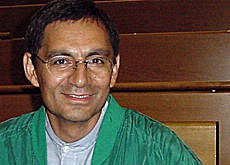
Changing the world through dialogue

In an era of globalisation, does dialogue still play a role? And what contribution can religion make to this dialogue?
As the World Social Forum (WSF) drew to a close in Mumbai, swissinfo met the Protestant theologian and resident of canton Vaud, Shafique Keshavjee.
Shafique Keshavjee is originally from India and currently works at a centre for inter-religious dialogue in Lausanne. He has recently written a novel, called “The Princess and the Prophet”, set in Mumbai, about a encounter between a head of a multinational and a beggar girl.
swissinfo’s Andrea Tognina caught up with the theologian as he prepared to leave Mumbai, to learn more about his views on globalisation and its opponents, the WSF as well as the World Economic Forum, which wrapped up in Davos on Sunday.
swissinfo: In one of your books, you talk of an ideal world where open dialogue is possible. Have you experienced this dialogue at the WSF?
Shafique Keshavjee: Not really, in the sense that that there was a forum and a resistance movement. But that doesn’t bother me, as we need to have several approaches: a soft approach, a more open one and a much stronger one.
The organisers’ decision not to involve states or the multinationals in discussions made this forum a space for protest. It’s a way of being a counterweight to the forum in Davos.
Having said that, those with power are at Davos, and I think we must at least try to address the questions being raised there.
swissinfo: Would you go to Davos if you were invited?
S.K.: I’m inclined to say yes. But it’s problematic: if you don’t go, then you let them dominate the event, but if you go, you risk being drawn into it.
Dialogue does already exist at Davos, but for the people in power hear our message, the WSF has to become a stronger force, because these people only understand the logic of power.
swissinfo: Do you think religion has a role to play in the anti-globalisation movement? In certain countries, religion has a strong influence…
S.K.: I believe each religious tradition can generate openness and a more humane society. But it can also create opposition and exclusion.
At Mumbai, in contrast to what happened at [previous WSF meetings in] Porto Alegre, a religious dimension was brought into the debates. This is a good thing, because if you only look at the world in economic or political terms, you will understand nothing.
swissinfo: You have participated in social fora in Switzerland. Will you get more involved in them in the future?
S.K.: There are different ways to get involved. My vocation is to build bridges between worlds that have no contact with each other.
I will continue to keep in contact with the WSF because it helps to develop all sorts of ideas. But at the same time, I don’t want to be associated with just one forum.
I find it hard to adhere to slogans such as “No to the World Trade Organization”, or multinationals, or the World Bank. You need to make severe criticisms, but sometimes these statements are too easy. For all its faults, the World Bank has built toilets in shantytowns in Mumbai, for example.
swissinfo: So how can dialogue make a difference?
S.K.: It already exists in a range of areas, for example, in the field of ethical commerce.
Ethical businesses were initially alienated from the main distribution networks but now they are part of them and are even collaborating with McDonalds for the supply of coffee.
In one sense it is a betrayal and it will help boost the profile of the fast food giant. But if McDonalds helps coffee producers to get more pay, is it better just to do nothing and hope the multinationals go under?
swissinfo-interview: Andrea Tognina in Mumbai
The Protestant theologian Shafique Keshavjee was born in 1955.
He is originally from the state of Gujarat in India.
He now lives in canton Vaud and works at a centre for inter-religious dialogue in Lausanne.
His latest novel is called “The Princess and the Prophet”.

In compliance with the JTI standards
More: SWI swissinfo.ch certified by the Journalism Trust Initiative





























You can find an overview of ongoing debates with our journalists here . Please join us!
If you want to start a conversation about a topic raised in this article or want to report factual errors, email us at english@swissinfo.ch.